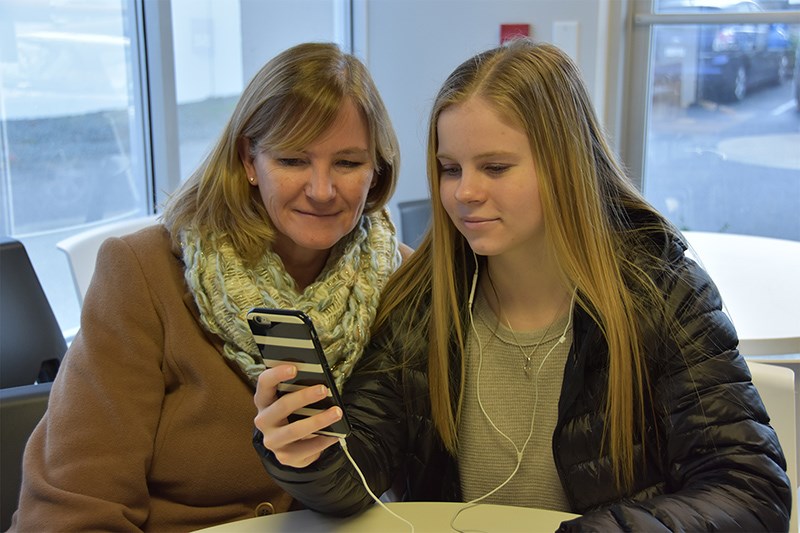When Tannis McKay heads to university in Virginia on a soccer scholarship in two years, she’ll be packing her digital audiobooks and headphones along with her cleats and shin pads.
That’s because the 16-year-old Port Moody resident, a whiz on the pitch, has struggled with reading since she was in elementary school because of dyslexia.
“My number one struggle was other people knowing,” McKay told The Tri-City News.
But today, the teen is comfortable bringing out her laptop or cellphone and headphones to read using a digital audiobook service developed for people with dyslexia. In class, while her friends read the assigned novels, McKay listens to the book and follows along on a digital copy with the words being read highlighted in yellow.
“Now it’s easier, everyone knows, everyone supports me,” McKay said.
But this kind of audiobook service for school kids with dyslexia is not well known, according to her mom, Cathy McMillan, a founding member of Dyslexia BC.
Recently, the local advocate started a petition to get the province to fund all B.C. library access to the Centre for Equitable Library Access (CELA), which provides services, such as books, newspapers and magazines for people with print disabilities, such as those with dyslexia, visual impairment or other physical challenge that make reading a book difficult or impossible.
“It’s just hard to get to get services for dyslexic kids,” said McMillan, who described her daughter’s reading challenges as an information processing difficulty. “Lack of awareness is a huge problem.”
DENIED SERVICE
Currently, McMillan pays U.S. $150 for a service called Learning Ally, which she is only able to obtain because she can use her in-laws’ U.S. address to qualify.
When her daughter needed a Canadian book about Indigenous residential schools for school, it wasn’t available through the U.S. service. That’s when McMillan went on the hunt for a Canadian option and learned about CELA, a Canadian non-profit that provides services in French as well as English, and among other things has a collection of Canadian materials important for school kids studying Canadian literature.
But there’s a catch.
So far, only larger libraries, such as Coquitlam Public and the Fraser Valley Regional Library Service, which includes Port Coquitlam’s Terry Fox Library, are members of CELA and pay a fee so the service is free to patrons. CELA isn’t available to Port Moody residents.
“When we went to the Coquitlam library to sign up for CELA, we were denied, and the librarian did not offer NNELS [National Network for Equitable Library Service],” McMillan said.
Lynne Russell, Port Moody Public Library’s director of library services, said PMPL has NNELS for those who qualify and it is paid for by the province. People with print disabilities can go to the library and get personal attention along with audiobooks and other services, she said — they can also join a book club.
But McMillan, who lives in Port Moody, says people with print disabilities would benefit from a wider array of materials, technologies and support if they had access to both NNELS and CELA — especially kids with dyslexia who want to be able to download the service right to their smart phones, laptops or tablets with the voice synchronized to the words.
SCHOOLS NEED IT
For such students, a typical audiobook is not enough — they also need digital copy of the book so they can stop, look closer at the words, take notes and do other tasks.
McMillan said this kind of dual input would have improved her daughter’s reading skills and wishes it had been available when she was younger. She also said all schools in School District 43 should have access to it, as well as education and training in the service.
And she met with Port Moody-Coquitlam MLA Rick Glumac this week to lobby for CELA funding, something CELA says has been denied for the last four years.
“There’s been a variety of different ways we’ve tried to do this. It’s not been successful,” executive director Michael Ciccone told The Tri-City News.
Meanwhile, McKay, who has benefitted from a digital audiobook service for three years, said she is looking forward to finishing high school and moving on to Radford University in Virginia while her mom continues to push for services for dyslexic kids back home.
“There are parents who would like to get this service in Metro Vancouver,” McMillan said. “But for our guys, it’s always a struggle to get the service.”



